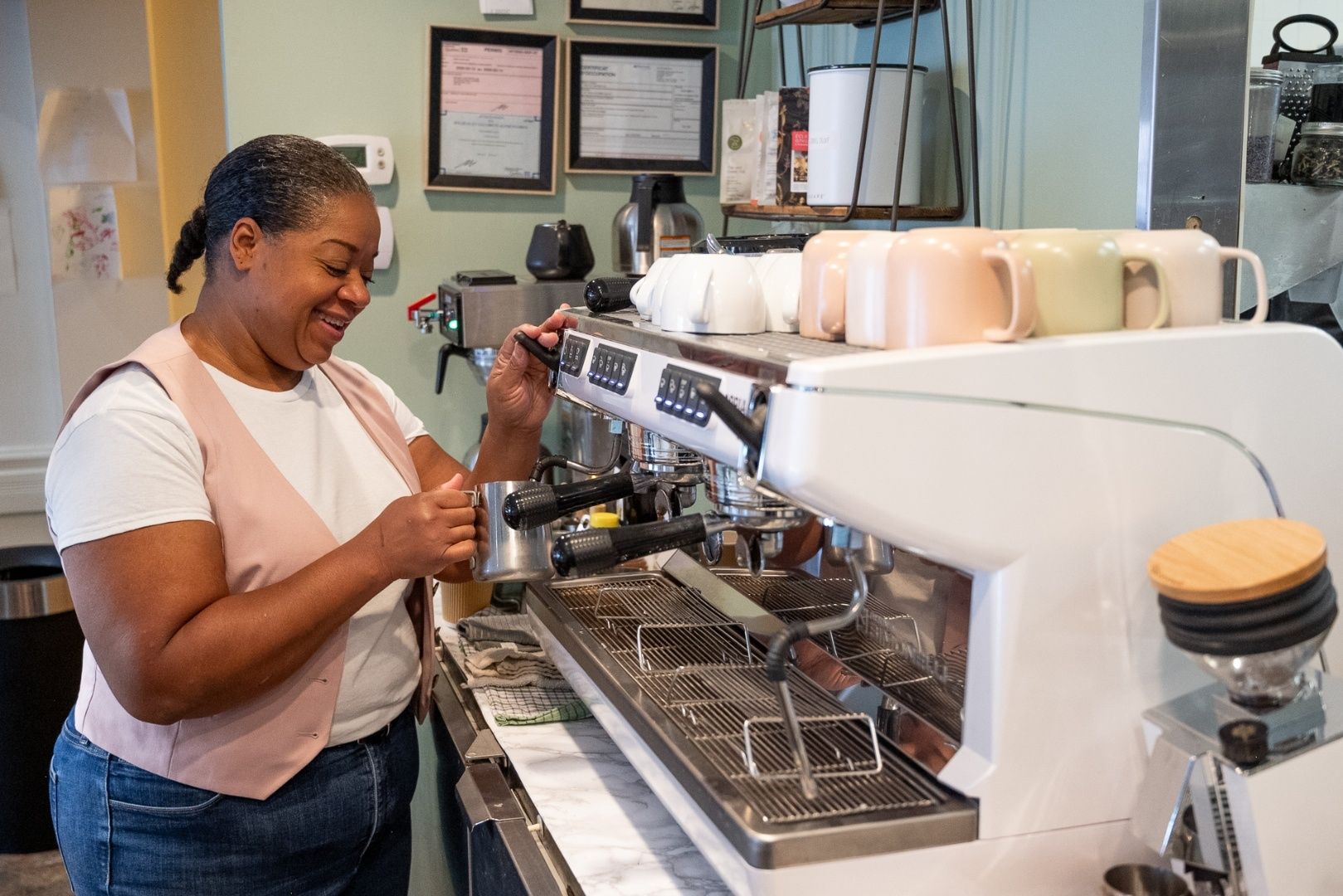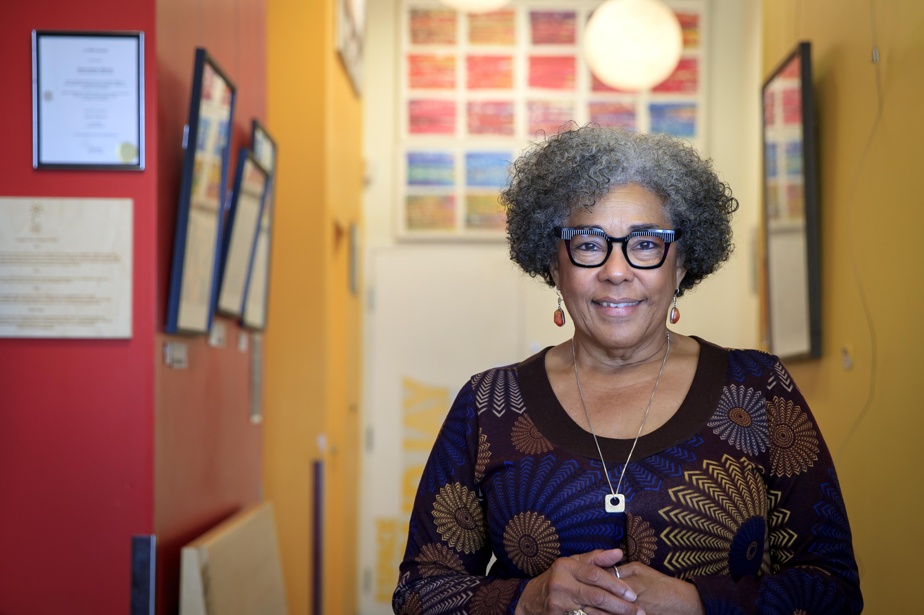“Hi, coach! ” The voices of teenagers in sportswear are heard in the big gym where their soccer training is going to take place. One by one, the young people pass by Abdel to shake his hand before going to get ready in their respective changing rooms.
Abdelaziz Mohamad has always been sporty and cheerful. At least that's what his young people, whom he has been coaching for five years now, think. “I've been with them since they were in the first year of high school. Today, I am accompanying them in their final year. I saw them grow up,” Abdel explains right away.
Among the soccer balls that are scattered all over the gym's polished floor, La Converse accompanies coach Abdel during a training session with his young people. While attending Joseph-François-Perrault High School himself, he decided to give back to his community by helping teens through sport.
An atypical career
“I have a fairly unusual background,” the coach then begins. I studied here, at the Joseph-François-Perrault school, which is called “JFP.” Abdel also played for the high school futsal (indoor soccer) team, a few years before becoming the coach. “Then, I went to Cégep du Vieux Montréal, I went to Cégep du Vieux Montréal, in human sciences, in an Individual profile,” he continues.
At the beginning of adulthood, Abdel faced certain difficulties that prevented him from continuing his studies full-time. “I finished CEGEP, but I was not able to continue my higher studies at university,” he regrets. I continued to work, I accumulated several jobs, part time or full time, night and day. It allowed me to develop a rhythm of life.”
Abdel says that he never intended to stop his studies, but that life decided otherwise. “During my youth, I was confronted with a lot of family problems. It was not always easy: separations, arguments, there were very often. I was raised in a loving family, but there were still a lot of problems at home,” he said. He thought for a few seconds, then continued: “It wasn't always pink. I have experienced situations with family members who have pushed me out the door.”
Barely of age, Abdel is therefore alone and must learn to live by relying only on himself. “I had to take care of myself, and it was very difficult. I was living in a shared room with strangers — not even friends. At that time, I had a part-time job and was still in school. But that didn't last: it wasn't easy at my age to juggle both at the same time.”
However, these darker moments did not reach Abdel. “I fought and did not give up. My goal was to have my own home, to be independent and to stop sharing a home with other people.” After another moment of silence, Abdel goes on to explain that his determination made him wait and save money to be able to achieve his goals a few years later.
Today, the 25-year-old coach has lived alone for three years. “I manage everything I have to manage by myself, I am autonomous,” he says proudly.
Studies or survival
Although he can be proud of the progress made, Abdel does not deny that he had to make sacrifices. “I had to interrupt my studies. Working full time did not allow me to go back to school,” he explains. The coach says that he could have continued to go to school, but does not think that he could have done it “cleanly.” “Going to school is great, but having good results is better. I didn't want to go to school to botch my studies.”
Despite everything, the young man believes that the interruption of his schooling is only temporary. “I am considering going back to school, of course. It's even my goal right now. I am working very hard to be able to afford to go back to school in the right way. I want to focus and succeed,” he relinquished with determination.
Being a big brother for your young people
In addition to being a coach, Abdelaziz is also a big brother. His youngest is now 18 years old. “My relationship with my brother taught me a lot about young people. You don't realize it, but when you grow up with a younger brother, you slowly get to know young people. Knowing what to say to my young people helps,” he says.
Junior, Khaled and Sebastian are three members of the team that Abdel coaches. The coach saw these three young people grow up. It was even they — and the rest of the team — who asked Abdel to continue coaching them for a fifth year in a row, while he was considering taking a break. After training on Sunday afternoon, they came to talk to us about their coach.
“Coach Abdel is like a big brother”, Junior begins. Captain of the indoor soccer team, he says that his coach took him under his wing as soon as he returned to high school. “Not only do we learn from him, because he is good at soccer, but he also shows us that he appreciates us beyond the sport,” continues the 16-year-old teenager. “He is a very disciplined person, and he teaches us this discipline. He coaches us, but helps us at the same time; that motivates us a lot,” he concludes.
He is followed by Khaled, his teammate, who confides that in addition to supporting them in sports, the former JFP student helps them in their daily lives. “He helps me a lot to have confidence in myself and to dare. At the beginning, it was in sports, but growing up with him, it pushed me to become more confident in the other aspects of my life,” he explains, still a bit out of breath from the physical exercise he has just done.
For his part, Sebastian has known Abdel since he was in junior high school. Today, he is graduating and considers his coach to be a trustworthy person. “He showed me that he believed in me. It helped me on the ground, but elsewhere even more so. He is an incredible, generous, kind, funny person,” he said in his high school locker room.
Sport as a remedy for problems
“When they come on the pitch, I teach my players that there are some things they can do and some things they can't. That they have teammates on the field and that they should consider each other as brothers. That they cannot abuse each other, that they should help each other and motivate each other. It's the same in society,” the coach lists.
At the same time, he adds that sport is a solution — among others — to street problems. “Young people are exposed to these problems every day, especially in abandoned and disadvantaged neighborhoods. We hear a lot about crime, gun violence, and drug use and sale among young people,” he begins. According to him, these problems that young people face are largely a result of the people around them and the environments they frequent when they grow up. “Nobody is going to wake up one day and decide to start Deal drugs or going to buy a gun. It's a question of influence,” he said.
Preventing these problems requires intervention with young people, says the Saint-Michel coach. “If you prepare young people and surround them, they will know how to react better to these influences. We can really limit and reduce the damage outside. I think that a young person who is focused, has his head on his shoulders, who is well surrounded and who has good values will not be easily influenced or drawn into dark stories,” he says.
When it comes to training, he believes that he is doing his job of working with young people through sport. “We often forget that, but sport pushes young people to become very disciplined. If you want to continue playing, you have to be at least organized and punctual: qualities that are necessary for adulthood,” he compares. Beyond the discipline, soccer also has a positive effect on the morale of young people. “Personally, when I'm not feeling great, I just need to touch a ball, and I forget everything. I know that afterwards, I can get going again, I can start again. This bad energy goes away, and it's the same for teens. It's something really special that they are experiencing while training here,” he says with a smile on his face.
“You can't control culture from outside”
With hindsight, which he has acquired by dint of being around adolescents, Abdelaziz believes that what young people lack is motivation and values. “In a neighborhood like here, in Saint-Michel, young people touch a bit of everything. When they are in school, they are supervised, they act in a more disciplined way. When they leave the school walls, they find themselves outside, and you can't really control the outside culture.”
This “outside culture” is a reference to what happens on the streets, in the Hood. Ce Hood, it often has a negative connotation in Saint-Michel.
However, Abdel recalls that, when you are a teenager, you are very influential and you more easily make impulsive decisions that have negative consequences. “When a 15- or 16-year-old starts something bad — related to the problems we talked about earlier — he does not necessarily realize what he is doing. He does not necessarily have a negative objective; he is often convinced that he knows what he is doing. But he doesn't know it, and young people should always be reminded to think before acting and to think about the future,” he explains.
In conclusion, Abdel wants to send an important message to young people: “Everything we do has an impact on the future. Really. You have to focus on the importance of life.” A bit emotional, he goes back to himself: “I can confirm that life is Really ephemeral. There are people who die every day. As soon as we make a decision, we have to think about where it will take us, who it will affect. Acting impulsively leads nowhere,” concludes coach Abdel.
By instilling values related to sport in his young people, Abdel wants “not only to model athletes, but also men, future adults.” He continues his momentum by saying that he wants to “train young people who are respectful, motivated and, above all, educated — who always want to continue learning” and hopes that “the negative that happens in their lives pushes them to move forward and not to regress.”




%20(1).avif)
.jpg)
%20(1).webp)

.jpg)

